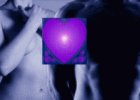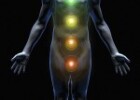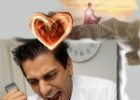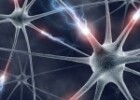Prometheus Unchained: Philosophical Approach to Obtaining Consciousness
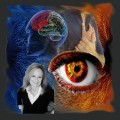
You never know when or where you will encounter a thought that has great impact or wisdom. It may come in the simplest of acts, such as vacuuming your car. This recently occurred happened to me. One day when I was vacuuming the back seat of my car, I heard music and recognized immediately one of my favorite songs that I had not heard in a long time., With or Without You by U2 was playing. I realized that my CD deck had mysteriously turned on, and this got my attention. Knowing that when something out-of-the ordinary occurs, I need to pay attention, so I listened to the words:
See the stone set in your eyes
See the thorn twist in your side
I wait for you
Sleight of hand and twist of fate
On a bed of nails she makes me wait
And I wait without you
With or without you
With or without you
The songwriter may have written these lyrics to tell of a lover’s long wait for his beloved, but I have always interpreted this verse as being about the suffering a person undergoes in desiring the Beloved (or the feminine soul) to unite within, resulting in a coming into wholeness of the psyche. Listening to this song reconnected me to a painting I have of Prometheus, and from there I came into a profound understanding of how a person can let go of suffering in his/her life to find greater peace and happiness to what is.
My study of the Prometheus painting that I purchased several years ago has shed an interesting light on Bono’s lyrics. This painting led me to investigate the Greek myth “Prometheus,” the biblical account of the sacrifice of Christ, and Mary Shelley’s novel Frankenstein. While these references might appear completely unrelated, all three works share common themes that depict the stages of consciousness transformation.
The painting, titled Prometheus, by Tomasz Rut drew me in immediately, so I knew I had to bid on it at an auction. After several counterbids, I walked away with an almost-too-large painting that barely fit into my small car. But I never regretted the investment. The painter was commissioned to repair the murals at the Sistine Chapel, so I believed he would have an underlying resonance to the spiritual symbology that he depicts in his art. The Prometheus painting is of the Titan Prometheus trying to rise to his feet as one of the transformed furies administers care to him at the end of his long day of suffering. I, though, was confused, and saw the painting as depicting Christ after his sacrifice on the cross, with an angel helping him rise to his feet.
In the myth, the hero, Prometheus, is a Titan deity who finds the courage to steal fire, which represents knowledge, from the Gods. Once he obtains this knowledge, he challenges the omnipotent power of the Gods by gifting this knowledge to humanity. An important key is that this challenge comes without ego-enhancing seductions such as ambition, envy, revenge, or grandiose personifications. He relates to the Gods as an equal partner, and therefore does not disempower himself with fear-based reactivity. Prometheus has the ego strength not to fall into those ego traps, which would only ensure his defeat.
Another pattern in this myth is the conflict between man and free will. One particular God, Jupiter, represents destiny, and it is this tension that depicts man’s struggle with his free will and his fate. Destiny is a structure that is innate within the human psyche, which limits uncontrolled free will, and this boundary assists an undeveloped mind. An undeveloped mind is one that is “comatose,” closed off to the unconscious and the intents that lie beneath a person’s actions.
Undeveloped egos do not have access to free will, even though they believe they do. The reasoning is simple. An undeveloped mind that is given uncontrolled free will serves to enact deeds that are unreasonable and unconscionable. An undeveloped mind is the source of undue pain to others in the form of oppression, suppression, manipulation, and abuse.
The struggle that man has with free will reflects modern humanity’s conflict with tyranny due to man’s immature patterns with authority figures, such as projecting relationship patterns with parents onto an authority figure. In the myth of “Prometheus,” this tension causes the Gods to punish Prometheus, for his act of gifting humanity with fire (knowledge) is viewed as an act of rebellion that a son might display toward a father figure. The Gods order him chained to a rock, and every day an eagle tears his flesh at his side and eats his liver.
This myth can be likened to the Biblical account of the crucifixion of Jesus. Like Prometheus, Jesus uncompromisingly speaks truth to power figures. Jesus, the Son, is nailed on the cross and calls out, “Why have you forsaken me, Father?” This last statement voices the tension to power (authority) that Jesus felt before surrendering his conscious will and entering into the death of transformation. Surrendering into suffering is an important aspect in transforming into a larger state of consciousness where more resources reside to assist people in their life journey.
I view the myth of “Prometheus” as demonstrating that once man receives knowledge, then man is to undergo another stage in consciousness growth. He first finds the ego strength and courage to challenge the Gods’ authority. It is important that this task not be completed out of a parent/child dynamic. Second, the “Prometheus” myth delves into the conflict or tension of that authority. This requires an awareness of the tension and the ability to remain in the tension. Third, after extreme conflict develops and man utterly surrenders his conscious will, then man undergoes consciousness transformation, resulting in a unity of the conflictual elements and a mind that is serene and focused.
Little did I know that the biblical story and the myth of the ancient Greeks share common themes. These themes describe the alchemical process that occurs within the psyche to liberate the mind from fear-based reality. It is this process that takes people from a comatose state to one of being fully present when engaging with life. A person who is “comatose” interprets his/her experiences out of high degrees of fear, which the mind shuts down or becomes so highly defended against that it projects this fear-based reality onto the person’s external world.
The theme in “Prometheus” and in the account of the sacrifice of Jesus is that after a person obtains a level of wisdom, then he/she must take on the responsibility of his/her own suffering. This requires the person to recognize the disowned self in another, or his/her role in or contribution to the situation. Then, the person allows the vulnerability of that suffering to exist until the magic of the alchemical process of the mind occurs and the suffering is released, giving way to a new life or rebirth.
Another work that contains patterns similar to the “Prometheus” myth is the novel Frankenstein: A Modern Prometheus, where Mary Shelley brings ideas from the myth into the early 19th century. During the time when Mary Shelley was writing her novel, she was discussing the figure of Prometheus with her husband, Percy Shelley (who wrote the drama Prometheus Unbound) and Lord Byron, who wrote the poem “Prometheus.”
I am going to explore similar themes in these works and relate them to processes of consciousness awareness and responsible creativity, two important elements used in transforming ego from processing out of fear to operating from serenity of mind. I will provide a simple example, one that I am sure we have all experienced at some time or another: the frustration of waiting in a long line at Starbucks.
First, I will define the terms consciousness awareness and responsible creativity. I define consciousness awareness as the ability to clearly see the intent behind each creative action you take. Knowing when you are in a reactive state helps you to develop this type of awareness. This means you have the ability to identify when there is a fear underlying your action and behavior. Any reaction, such as anger or unworthiness, is fear based, and a serene mind is one that has clarity and focus. This is how you distinguish between the two. The action you take can be small and seem inconsequential in comparison to daily events. Let’s consider our example at Starbucks. George reports feeling frustrated by standing in long lines at Starbucks. The first step in consciousness awareness is his recognizing his frustration and that the frustration is linked to his distorted projection or perception of the situation.
Responsible creativity is your ability to become “responsible” for every act that you manifest. In the novel Frankenstein, this is seen when Dr. Victor Frankenstein fails to care for his creation, who develops into a monster due to his creator’s lack of care. The same holds true in consciousness creativity. If we don’t take responsibility for how we interact and engage with our life, then we will create drama, conflict, disease, and pain for others, and live a roller-coaster life of ups and downs. Using our Starbucks example, George begins the process of responsible creativity by first recognizing that his frustration at waiting in line is not the result of a long line, but rather reflects his perception of waiting. When he allows himself to be present with his frustration, that is, to see what is underneath his anger, he gets in touch with a pattern of fear of not feeling important. This pattern of “I’m not important” leads to a deep fear of annihilation, because if he is not important, he is alone and can’t survive. This may seem ridiculous, but this is a thought pattern of a very young child, and actually is common in many adults. Once he realizes his basic fear of “I’m not important” and holds it in an open consciousness state, and does not become victimized by it, the whole fear structure breaks down. His reactivity falls away, and he has a serene mind.
To do this type of consciousness work is to open oneself into experiencing joy, hope, and true free will. As Percy Shelley beautifully and eloquently writes in his epilogue to Prometheus Unbound:
To suffer woes which Hope thinks infinite;
To forgive wrongs darker than death or night;
To defy Power, which seems omnipotent;
To love, and bear;
to hope till Hope creates From its own wreck the thing it contemplates;
Neither to change, nor falter, nor repent;
This, like thy glory, Titan, is to be Good, great and joyous, beautiful and free;
This is alone Life, Joy, Empire, and Victory.
Enough said.
